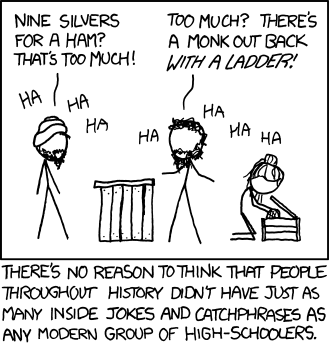For the past 3 or so months, we’ve been looking at the importance of Jerusalem and why David wanted to move his capital there. Now it’s time to look at the conquest of Jerusalem itself:
ו וילך המלך ואנשיו ירושלם אל היבסי יושב הארץ; ויאמר לדוד לאמר לא תבוא הנה כי אם הסירך העורים והפסחים לאמר לא יבוא דוד הנה׃
ז וילכד דוד את מצדת ציון היא עיר דוד׃
ח ויאמר דוד ביום ההוא כל מכה יבסי ויגע בצנור ואת הפסחים ואת העורים שנאו (שנואי) נפש דוד; על כן יאמרו עור ופסח לא יבוא אל הבית׃
ט וישב דוד במצדה ויקרא לה עיר דוד; ויבן דוד סביב מן המלוא וביתה׃
י וילך דוד הלוך וגדול; וה׳ אלקי צבאות עמו׃
Does that make any sense? There are only five psukim here:
- David invests Jerusalem and is told he will not be able to enter
- David takes the fortress
- David makes an oath (with aposiopesis) about taking Jerusalem, and an aphorism is cited
- David settles in Jerusalem
- David is great
Now, I will assume that פסוק ז is an introduction to the rest: David takes the fortress, and here’s how. And פסוקים ט-י are the conclusion. But what’s all this about עורים ופסחים? And what’s a צנור, and how is it relevant?
Hopefully, the parallel paragraph in דברי הימים will help:
ד וילך דויד וכל ישראל ירושלם היא יבוס; ושם היבוסי ישבי הארץ׃
ה ויאמרו ישבי יבוס לדויד לא תבוא הנה; וילכד דויד את מצדת ציון היא עיר דויד׃
ו ויאמר דויד כל מכה יבוסי בראשונה יהיה לראש ולשר; ויעל בראשונה יואב בן צרויה ויהי לראש׃
ז וישב דויד במצד; על כן קראו לו עיר דויד׃
ח ויבן העיר מסביב מן המלוא ועד הסביב; ויואב יחיה את שאר העיר׃
ט וילך דויד הלוך וגדול; וה׳ צבאות עמו׃
This completes the aposiopesis, and introduces Yoav as the actual conqueror of Jerusalem. So now I have another question: what happened to the עורים ופסחים and the צנור? Why is Yoav left out of שמואל ב?
There’s a fifth question that is much more subtle: where’s the battle of Jerusalem?
It’s hard to notice something that isn’t there if you’re not looking for it.
[Gregory, Scotland Yard detective:] “Is there any other point to which you would wish to draw my attention?”
[Sherlock Holmes:] “To the curious incident of the dog in the night-time.”
“The dog did nothing in the night-time.”
“That was the curious incident,” remarked Sherlock Holmes.
Battle Plans
ספר שמואל loves battles. We know how many soldiers on each side, where they are deployed, what weapons they carry, what strategies they used. It’s like reading a Tom Clancy novel. A few examples:
א ויהי דבר שמואל לכל ישראל; ויצא ישראל לקראת פלשתים למלחמה ויחנו על האבן העזר ופלשתים חנו באפק׃
ב ויערכו פלשתים לקראת ישראל ותטש המלחמה וינגף ישראל לפני פלשתים; ויכו במערכה בשדה כארבעת אלפים איש׃
ה ופלשתים נאספו להלחם עם ישראל שלשים אלף רכב וששת אלפים פרשים ועם כחול אשר על שפת הים לרב; ויעלו ויחנו במכמש קדמת בית און׃
ו ואיש ישראל ראו כי צר לו כי נגש העם; ויתחבאו העם במערות ובחוחים ובסלעים ובצרחים ובברות׃
ז ועברים עברו את הירדן ארץ גד וגלעד; ושאול עודנו בגלגל וכל העם חרדו אחריו׃
א ויאספו פלשתים את מחניהם למלחמה ויאספו שכה אשר ליהודה; ויחנו בין שוכה ובין עזקה באפס דמים׃
ב ושאול ואיש ישראל נאספו ויחנו בעמק האלה; ויערכו מלחמה לקראת פלשתים׃
ג ופלשתים עמדים אל ההר מזה וישראל עמדים אל ההר מזה; והגיא ביניהם׃
…
נב ויקמו אנשי ישראל ויהודה וירעו וירדפו את הפלשתים עד בואך גיא ועד שערי עקרון; ויפלו חללי פלשתים בדרך שערים ועד גת ועד עקרון׃
But the conquest of Jerusalem, the capital of the united kingdom of Israel? Gornisht. וילכד דוד את מצדת ציון. Where is the the battle of Jerusalem?
Answering that may turn out to be the key to understanding the entire text.
Handicap Accessible
But first, what are העורים והפסחים? I’m going to assume that it can’t be literal; Jerusalem was not defended by an army of the blind and lame. It may have been a well-known expression at the time that unfortunately means nothing to us:
If the Jebisites had yelled from the fortress walls, “your mother was a hamster and your father smelled of elderberries”, I would understand immediately. Normal people would not. The Abarbanel and מצודת suggest this sort of thing here:
כי אם הסירך וכו׳: אמר בדרך הפלגה וגוזמא לא תוכל לבוא הנה כי אם מקודם יהיה הסירך מפה כל אנשים ואף העורים והפסחים כי אם ישאר מי מהם היכולת בידם לעכב ביאתך הנה בעבור גודל חוזק המקום.
This explains על כן יאמרו עור ופסח לא יבוא אל הבית; על כן יאמרו would mean “in situations like this, people said”. But that doesn’t go with David’s response, which apparently takes it seriously.
Yigal Yadin, the Israeli archeologist, suggests it’s a different cultural catchphrase:
Yigal Yadin made an interesting suggestion in his book, Torat Ha-Lechima Be-Artzot Ha-Mikra. Yadin relies on a Hittite document that describes a ceremony in which the Hittite army swears allegiance to its king. There it is stated that anyone who thinks badly of the king will himself become blind or lame. The Yevusites, who understood that they would not be able to stand up against David, brought the blind and the lame up on the wall, and threatened David with a staged ceremony featuring an oath at the end of which the punishment of blindness and lameness was promised to anyone who touches the blind or the lame or any of the Yevusites. Our chapter does not cite the entire oath, but only its beginning. In any event, in the wake of the oath, David had to promise a special reward to one who proved to the entire army that nothing would happen to those who entered the city and smote the blind and the lame.
But interpreting this based on a single document from 500 years before and 500 miles away is far-fetched, to say the least.
Rashi and the targum give a straightforward explanation:
העורים והפסחים: הם עבודת כוכבים שלהם.
וַאֲמַרוּ לְדָוִד לְמֵימַר לָא תֵיעוּל הַלְכָא אֱלָהֵין בְּאַעְדָיוּתָךְ חַטָאַיָא וְחַיָבַיָא…
The Jebusites didn’t call their idols עורים ופסחים; that was an editorial comment by the author, as we say in Hallel:
ד עצביהם כסף וזהב; מעשה ידי אדם׃
ה פה להם ולא ידברו; עינים להם ולא יראו׃
ו אזנים להם ולא ישמעו; אף להם ולא יריחון׃
ז ידיהם ולא ימישון רגליהם ולא יהלכו; לא יהגו בגרונם׃
ח כמוהם יהיו עשיהם כל אשר בטח בהם׃
That’s the most פשט explanation, I think. But the Malbim has a fascinating theory, based on the צנור which in mishnaic and modern Hebrew means “pipe”:
כפי הפשט ערבים עלי דברי הרלב״ג, שבשער העיר עשו צלמים בדמות עורים ופסחים והיו עשויים באופן מהתחבולה שירימו ויניעו בכחם מקלות ומוטות של ברזל רבי המשקל, תנועה חזקה בענין שלא יוכל אדם לקרב שם כי יכו אותו הצלמים במקלות (ויוכל להיות שג״כ עמדו תחתיהם עורים ופסחים ממש עוזרים בהנעתם) והיו סמוכים לצנור המים באופן שהיה הצנור מוציא המים מפיו, וע״י הגרת המים ושטיפתם התנענעו הצלמים והמקלות כאשר יהיה ברחיים, וכמו שראה תחבולות אלה בעיניו, עכ״ד. וכפי זה העמידו סמוך לשער העיר שורה של צלמים בדמות עורים, ואחריה שורה של צלמים בדמות פסחים, ואחריהם הצנור מוגיר המים.
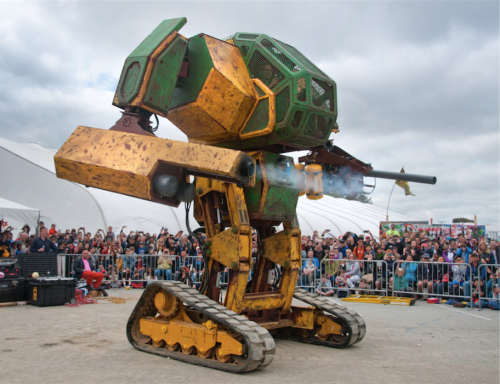
Giant hydraulic battle robots! I’d watch that movie. But I find that even more far-fetched than the Hittite curse explanation.
The Midrash looks specifically at the terms עורים ופסחים. Who were the most famous blind and lame people in תנ״ך?
ויהי כי זקן יצחק ותכהין עיניו מראת; ויקרא את עשו בנו הגדל ויאמר אליו בני ויאמר אליו הנני׃
ויזרח לו השמש כאשר עבר את פנואל; והוא צלע על ירכו׃
And Rashi brings up the midrash that ties them to Jerusalem. It goes back to Abraham and his treaty with Avimelech, the treaty of “son and grandson”:
כב ויהי בעת ההוא ויאמר אבימלך ופיכל שר צבאו אל אברהם לאמר; אלקים עמך בכל אשר אתה עשה׃
כג ועתה השבעה לי באלקים הנה אם תשקר לי ולניני ולנכדי; כחסד אשר עשיתי עמך תעשה עמדי ועם הארץ אשר גרתה בה׃
כד ויאמר אברהם אנכי אשבע׃
לא יכלו בני יהודה להורישם : שנינו בספרי רבי יהושע בן קרחה אומר יכולין היו אלא שלא היו רשאין מחמת השבועה שנשבע אברהם לאבימלך, ויבוסי זה לא על שם האומה היה אלא מגדל דוד שהיה בירושלים ושמו יבוס ובני אותו מחוז מפלשתים היו וכשכבשו בני יהודה את ירושלים לא הורישו את בני אותו מחוז.
ואמרו רז״ל יכולין היו אלא שלא היו רשאים מפני השבועה שנשבע אברהם לאבימלך. והיבוסי הזה…אדם אחד שהיה שמו יבוס והיה מפלשתים מזרע אבימלך ונקרא המקום על שמו יבוס ואנשי המשפחה ההיא יושבי ירושלם…
מה עשו אנשי יבוס עשו צלמי נחשת והעמידו אותם ברחוב העיר וכתבו עליהם שבועת אברהם, וכשבאו ישראל רץ להכנס בעיר היבוסי ולא היה יכול מפני ברית אברהם, שנ׳ ואת היבוסי יושבי ירושלם לא הורישו בני ישראל. וכשמלך דוד בקש להכנס לעיר היבוסי ולא הניחו אותו, שנ׳ ויאמר לדוד לא תבא הנה וכו׳ והיו ישראל כחול הים אלא בכח השבועה וברית אברהם…ואין אתה יכול ליכנס בעיר היבוסי עד שהתיר כל הצלמים הללו שכתוב עליהם שבועת אות ברית אברהם, שנ׳ כי אם הסירך העורים והפסחים.
והנה היה היבוסי יושב בירושלם ולא יכול דוד להוציאם משם בעבור שבועת אברהם לאבימלך שהיתה כתובה בצלמים אשר שם שהם עורים ופסחים כי עינים להם ולא יראו רגלים ולא יהלכו ואפשר שהיו הצלמים ההם בצורת עור ופסח העור להורות על ברית יצחק שבסוף ימיו כהו עיניו מראות והפסח בעבור יעקב שהיה צולע על יריכו ועשו זה להורות שכבר נשתלש להם זה הברית עם האבות בכללם. ולזאת הסבה אמר היבוסי לדוד לא תבא הנה אם לא הסירות תחלה העורים והפסחים שבהם זכירת זה הברית כאילו יאמר לא יבא דוד הנה כי לא יוכל להסיר אלו הצלמים שבהם זכירת זה הברית.
It’s a nice idea, but why would removing the statues end the treaty? בני ישראל still can’t betray the Jebusites if they swore not to!
Politically Incorrect
We’ll come back to that. So we have 4 different explanations of העורים והפסחים: cultural expression, idols, robots, and memorials. How does that fit with על כן יאמרו עור ופסח לא יבוא אל הבית?
If we read it straight, it means, “therefore they say, the blind and the lame will not come to the house”, meaning that because of this battle, the עורים ופסחים cannot come into Jerusalem any more. The Radak takes this literally:
על כן יאמרו: כי מהיום ההוא ואילך לא יבא עור ופסח אל הבית הזה היא מצודת ציון לבזיון אותן העורים והפסחים ולזכרון לדורות היאך לכדה דוד.
But that’s taking it too literally. If we read העורים והפסחים as “idols” then it makes sense:
עַל כֵּן יֵימְרוּן חַטָאַיָא וְחַיָבַיָא לָא יַעֲלוּן לְבֵיתָא׃
David would allow the Jebusites to remain in Jerusalem (he will later buy the site of the altar from ארונה היבסי) but no idolatry.
If we read העורים והפסחים as an pre-existing expression, it has to mean, “thus [in situations like this], people say: The blind and the lame! Don’t come to the house!”. That works.
The other explanations need us to realize that the syntax of על כן יאמרו עור ופסח לא יבוא אל הבית is very ambiguous. עור ופסח could be the subject of יבוא, so the sentence means “They say: the blind and the lame will not come”. But עור ופסח could also be the subject of יאמרו: ”The blind and the lame say: he will not come“, referring to David specifically.
Also, על כן in תנ״ך may not mean “therefore” (A על כן B means A causes B). It can mean “because” (A על כן B means B causes A). One example:
ז ויאמר; אל נא אחי תרעו׃
ח הנה נא לי שתי בנות אשר לא ידעו איש אוציאה נא אתהן אליכם ועשו להן כטוב בעיניכם; רק לאנשים האל אל תעשו דבר כי על כן באו בצל קרתי׃
So על כן יאמרו עור ופסח לא יבוא אל הבית means that David announced כל מכה יבסי ויגע בצנור ואת הפסחים ואת העורים because ”the blind and the lame“ (which the Jebusites are depending on to defend their city) “say” (their very existence means) “he [David] cannot enter”.
על כן יאמרו: על אשר אומרים.
עור ופסח: בעוד שהעור והפסח יהיה בכאן לא יבא וגו׳.
על כן יאמרו עור ופסח. ר״ל יען שהעורים והפסחים יאמרו שלא יבא דוד אל הבית.
Pipe Dreams
Now, what was the צנור that David wanted attacked?
Almost all the early מפרשים understand it to be the name of a tower:
כָּל דְיִקְטַל יְבוּסָאָה וְיִשְׁרֵי לְמִכְבַּשׁ כְּרַכָּא
והיו שני הצלמים [עור ופסח] במגדל הנקרא צנור.
כל מכה יבוסי: מי אשר יעלה בראשונה ויכה את היבוסי ומתחלה יגע בצנור להפילו והוא המגדל החזק אשר תלו בו כל בטחונם.
But the word does appear in תנ״ך two other times, and both times the modern sense of “pipe” or “watercourse” fits better:
ז אלקי עלי נפשי תשתוחח;
על כן אזכרך מארץ ירדן; וחרמונים מהר מצער׃
ח תהום אל תהום קורא לקול צנוריך;
כל משבריך וגליך עלי עברו׃
7 O my G-d, my soul is cast down within me;
therefore do I remember Thee from the land of Jordan, and the Hermons, from the hill Mizar.
8 Deep calleth unto deep at the voice of Thy cataracts;
all Thy waves and Thy billows are gone over me.
ח ויהי דבר ה׳ אלי לאמר׃
ט ידי זרבבל יסדו הבית הזה וידיו תבצענה; וידעת כי ה׳ צבאות שלחני אליכם׃
י כי מי בז ליום קטנות ושמחו וראו את האבן הבדיל ביד זרבבל שבעה אלה; עיני ה׳ המה משוטטים בכל הארץ׃
יא ואען ואמר אליו; מה שני הזיתים האלה על ימין המנורה ועל שמאולה׃
יב ואען שנית ואמר אליו; מה שתי שבלי הזיתים אשר ביד שני צנתרות הזהב המריקים מעליהם הזהב׃
So, as we mentioned, the Malbim translates as “pipe” for waterworks:
אז אמר שמי שילחם מצד הזה והלאה, מוכרח להכות יבוסי תחלה, שהם אנשי החיל שעמדו בין המצודה ובין הצלמים, ואח״כ יגע בצנור המוגיר מים על הצלמים, כי הבא מצד זה יהיה סדר פגיעתו תחלה בהצנור ואח״כ בהפסחים ואח״כ בהעורים.
David is planning the strategy: first take out the guards, then the צנור, then you can take out the עורים ופסחים.
But more likely than a pipe, it’s a tunnel that is part of the water supply for Jerusalem. Before Hezekiah built his tunnel, the water supply came from the Gihon spring just outside the wall.
In 1867 the archeologist and treasure hunter Captain Charles Warren uncovered a secret access tunnel that led from the city deep into the mountain, meeting a 13-meter shaft descending to the Gihon Spring. Warren claimed this shaft was the place of the Biblical “pipe” used in King David’s capture of the city, and was used by the ancient Jerusalemites to draw their water from the Gihon Spring. Recent excavations have revealed that while Warren succeeded in uncovering a significant portion of the secret system, unbeknownst to him the secret tunnel continued another ten meters through what appeared to be a solid rock wall, leading to the massive Spring House and the true water compound of the time. This in fact may have been what King David was referring to when he challenged Joab Ben Zuriah “and David said…he who conquers the Jebusites, grabs the pipe…” (Samuel II 5:8)
From Warren’s sketches, via the Israel Antiquities Authority:
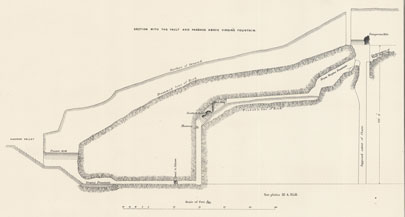
The recent findings, from Ronnie Reich and Eli Shukron, Light at the End of the Tunnel, Biblical Archaeology Review 25:1, JanuaryFebruary 1999<a>:
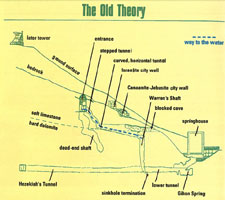
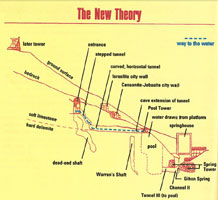
Like most archeological findings, this is “cute”. It may be true but it certainly tells a nice story.
An Offer They Can’t Refuse
So we put together the story: David’s army surrounds Jerusalem, then Yoav attacks the guards in the spring house, climbs through the צנור and destroys the עורים ופסחים. Then the story ends. Where’s the battle?
I suspect there’s no battle for Jerusalem in the text because there was no battle. The Jebusites were clearly depending on their עורים ופסחים (however we interpret this). Yoav’s ability to sneak in and destroy them let David make them an offer they couldn’t refuse. I think David conquered Jerusalem without a shot being fired.
The Midrash supports this (more metaphorically):
א למנצח לעבד ה׳ לדוד;
אשר דבר לה׳ את דברי השירה הזאת
ביום הציל ה׳ אותו מכף כל איביו ומיד שאול׃
ב ויאמר ארחמך ה׳ חזקי׃
…
ל כי בך ארץ גדוד; ובאלקי אֲדַלֶּג שׁוּר׃
What wall did David jump?
כי בך ארוץ גדוד: ר׳ חייא בשם ר׳ לוי אמר בשעה שהלך דוד לעשות מלחמה עם היבוסי, התחיל לומר כל מכה יבוסי ויגע בצנור (שמואל ב ה:ח), וכתוב אחר אומר כל מכה יבוסי [בראשונה] יהיה לראש ולשר (דברי הימים א יא:ו), מה עשה יואב, הביא ברוש אחד רענן, וקבעו בצד החומה, וכפף את ראש הברוש שהוא רך, ועלה על ראשו של דוד, ונתלה על הברוש, ודילג על החומה, אמר דוד יֶהֶלְמֵנִי צַדִּיק חֶסֶד וְיוֹכִיחֵנִי (תהלים קמא ה), מה עשה הקדוש ברוך הוא, קיצר את החומה, ועלה דוד אחריו, שנאמר ובאלקי אדלג שור.
And as we mentioned, David left (at least some of) the Jebusites alive. When David wants to build the altar in the place that would eventually be the בית המקדש, he buys it.
ויאמר המלך אל ארונה לא כי קנו אקנה מאותך במחיר ולא אעלה לה׳ אלקי עלות חנם; ויקן דוד את הגרן ואת הבקר בכסף שקלים חמשים׃
The parallel text in דברי הימים has a different amount:
ויתן דויד לארנן במקום שקלי זהב משקל שש מאות׃
There are lots of explanations of the difference, but the פרקי דרבי אליעזר says it was for two different things:
אמר דוד לאנשיו כל מי שיעלה בראשונה ויסיר את הצלמים הללו שכתוב עליהם אות ברית שבועת אברהם יהיה לראש, ועלה בראשונה יואב בן צרויה ויהי לראש. ואחר כך קנה את עיר היבוסי לישראל במכר זהב ובכתב עולם לאחוזת עולם, מה עשה לקח מכל שבט חמשים שקלים הרי כלם שש מאות שקלים, שנ׳ ויתן דוד לארנון.
David didn’t conquer Jerusalem, he paid for it.
(Admittedly, it was an absurdly small amount. Yoav’s commando raid made it clear that the Jebusites did not have any good options.)
Placing the Blame
So why the differences between שמואל and דברי הימים? שמואל has העורים והפסחים; דברי הימים has Yoav.
I don’t know, but I think it is due to the different purposes of the two books. שמואל pulls no punches in highlighting David’s ethical lapses. דברי הימים, written to inspire the Jews rebuilding Israel, presents David as the archetype of the Jewish king. He never sins; Batsheva is never mentioned; the murder of innocents in Ziklag never comes up. Even the one sin recorded, the census, is not David’s fault:
ויעמד שטן על ישראל; ויסת את דויד למנות את ישראל׃
So I would read this story as: Yoav destroyed the memorials to the treaty between Avimelech and Abraham and then the Jebusites surrendered. David technically never violated the treaty, but the implied threat certainly leaves a bad taste in our mouths. שמואל makes it clear that this was in fact David’s responsibility. דברי הימים places it all on Yoav’s shoulders (and incidentally introduces us to Yoav, who has not shown up in דברי הימים yet).
This idea, that Yoav was David’s ”enforcer“, is consistent with his role throughout the תנ״ך:
טו וימלך דוד על כל ישראל; ויהי דוד עשה משפט וצדקה לכל עמו׃
טז ויואב בן צרויה על הצבא; ויהושפט בן אחילוד מזכיר׃
שפטים ושטרים תתן לך בכל שעריך אשר ה׳ אלקיך נתן לך לשבטיך; ושפטו את העם משפט צדק׃
ר׳ אלעזר אמר אם אין שוטר אין שופט…אמר ר׳ אלעזר בן פדת אילמלא שיטנו של יואב, לא היה דוד יכול לעשות את הדין. וכן הוא אומר ”ויהי דוד עושה משפט וצדקה לכל עמו ויואב בן צרויה על הצבא“ (שמואל ב ח:טו-טז), וכי דוד ויואב שופטים היו, אלא כל מי שאינו שומע לדיין, מוסרין אותו ביד יואב, ומוציאין ממנו בעל כרחו.
Urban Renewal
After David takes over, he builds the city: ויבן דוד סביב מן המלוא וביתה (and ויואב יחיה את שאר העיר). What was the מלוא?
Radak says it was a defensive moat:
ומלאו החפירה המים כמו שעושין האנשים היום לחזק העיירות שלא יכנסו האנשים בקלות.
But we have no archeological evidence for such a thing, and there’s no way to get that much water around Jerusalem.
Others say it was a housing development (which complements Yoav’s role in urban renewal, יחיה את שאר העיר):
היקף חומה נמוכה, וממלאין אותה עפר וגובה התל באמצע, ומשפע והולך לכל רוח, הוא קרוי מלוא, ועליו בנה דוד בתים.
סמוך להחומה הניח מקום פנוי להיות מוכן להאסף שם מרבית אנשים…ומן המלוא ולפנים בנה בתים סביב.
It’s more evidence that the battle of Jerusalem never took place. The Jebusites were not displaced from their homes; the Israelites built new settlements alongside them. And so the last Canaanite stronghold in the land of Israel falls into Israelite hands. The conquest that started under Joshua 400 years earlier has finally ended, and now ילך דוד הלוך וגדול וה׳ אלקי צבאות עמו.
